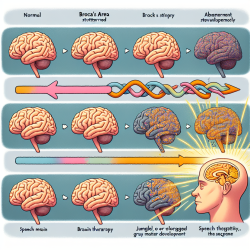Understanding Urban Ecological Security for Enhanced Therapy Practices
In the field of speech-language pathology, especially in online therapy services like those provided by TinyEYE, making data-driven decisions is crucial. A fascinating study titled Urban Ecological Security Simulation and Prediction Using an Improved Cellular Automata (CA) Approach—A Case Study for the City of Wuhan in China offers insights that can be applied to improve therapy outcomes. While the study focuses on urban ecological security, its methodologies and findings can inspire innovative approaches in therapy practices.
Key Insights from the Research
The study employs an improved Cellular Automata (CA) approach to simulate and predict urban ecological security at a fine scale, using the city of Wuhan as a case study. By integrating the geographically weighted regression (GWR) concept into the CA model, the researchers achieved a high level of accuracy in their simulations, as evidenced by a strong kappa coefficient.
Here are some key takeaways that can be translated into the context of speech-language pathology:
- Fine-Scale Analysis: Just as the study emphasizes the importance of district-level analysis for ecological security, speech-language pathologists can benefit from fine-scale assessments of a child's communication environment. This can include analyzing specific classroom settings or home environments to tailor therapy interventions.
- Integration of Multiple Data Sources: The study utilizes grid-scale data and various indicators to evaluate ecological security. Similarly, therapists can integrate data from multiple sources, such as teacher reports, parent feedback, and standardized test scores, to form a comprehensive understanding of a child's needs.
- Predictive Modeling: The CA model's predictive capabilities highlight the potential for forecasting therapy outcomes based on current data. Speech-language pathologists can develop predictive models to anticipate a child's progress and adjust interventions accordingly.
Encouraging Further Research
The study's innovative approach to urban ecological security simulation encourages speech-language pathologists to explore further research in predictive modeling and data integration. By adopting similar methodologies, therapists can enhance their practice and contribute to the field's body of knowledge.
Conclusion
By drawing parallels between urban ecological security and speech-language pathology, practitioners can leverage data-driven insights to improve therapy outcomes. The study's emphasis on fine-scale analysis, integration of diverse data sources, and predictive modeling offers valuable lessons for enhancing therapeutic practices.
To read the original research paper, please follow this link: Urban Ecological Security Simulation and Prediction Using an Improved Cellular Automata (CA) Approach—A Case Study for the City of Wuhan in China.










